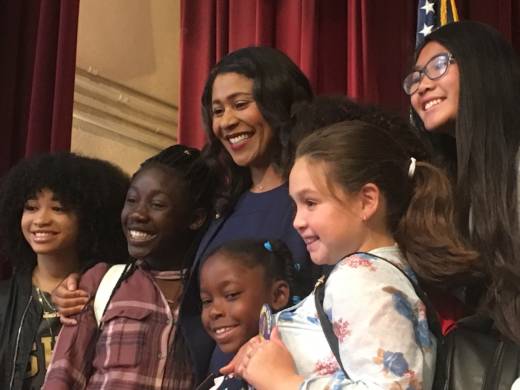It was a glimpse of the personality behind the politician who’ll soon sit in the mayor’s office.
In an interview later that afternoon at KQED’s studios, senior politics and government editor Scott Shafer asked her what she’ll need to learn to be an effective mayor. Breed said she needed to learn patience.
“The city has more layers of process and bureaucracy than we can stand. What I need to do is learn patience, and that I can’t get everything done in a day,” Breed said. “It’s just a natural part of my personality. If I see a pothole for example, I want the pothole fixed like now. We have so many challenges like that in the city. It’s not as if someone’s sitting around doing nothing. There’s just a lot of work to be done.”
Breed talked about cutting through that red tape and bureaucracy and removing administrative and policy speedbumps to build housing faster.
“Especially when you talk about 100 percent affordable housing (projects) and it still takes years to build even when you have financing for a project. That should not be the case,” she said.
Shafer pressed her on whether she would make policy changes that would require unions, neighborhood activists or environmentalists to make concessions.
“In terms of people backing off, I don’t necessarily believe that will occur. Because this is San Francisco. Nobody backs off,” she said.
Asked about the Hunters Point radiation contamination testing scandal, Breed admitted she’s still “not 100 percent sure specifically what went wrong.”
She said she plans to investigate the matter, and come up with a long-term plan to ease the tension with the community.
“It’s important to make sure that the residents that are there now are safe, that we have a company that we can trust to go over the testing, that we work with the Navy to get to a better place and that we use whatever legal means is at our disposal to get the job done right,” she said.
Shafer asked her if she would recommend to a friend or family member to buy a home on the former shipyard. Breed said, “Not at this time.”
Breed also talked about helping drug-addicted and mentally-ill homeless people and cleaning up San Francisco’s streets.
“The problem we have is people who struggle with mental illness. That’s going to be my focus: making changes to our laws and providing options for those who we can’t get housed. In some cases we can get them but can’t keep them housed,” she said.
Breed also wants to experiment with supervised injection sites to get IV drug users into addiction treatment programs. Such programs exist in Canada but haven’t been tried in the U.S. because providing space drug use is illegal under federal law.
She said she aims to have a good working relationship with the police department and its union, implementing the Department of Justice’s reform recommendations, and building trust in the African American and Latino communities that might have been wary of law enforcement because of how certain neighborhoods were policed.
Breed said she’ll protect all San Francisco residents whether they’re citizens or not, by maintaining the city’s current “sanctuary” policy of not cooperating with federal immigration authorities.
“I would do exactly what (Oakland) Mayor (Libby) Schaaf did, and I applaud her for her efforts. She’s taken a lot of heat for that and I will continue to be a supporter and advocate for what is right,” she said.
At the morning press conference, about a dozen children watched Breed from the floor of the school auditorium.
Breed pointed at them and said, “This is why we are here at Rosa Parks Elementary School. It is about the future of San Francisco. It is about making sure that the decisions we make today have a positive impact on the next generation of young people growing up in San Francisco in all of its neighborhoods.”
When a reporter asked who Breed plans to appoint to her seat on the Board of Supervisors, a gaggle of those grade school girls jumped up, leaned against the stage, and shouted, “Me! Me! Pick me!”
The Department of Elections still has to certify election results. Breed is expected to start her mayoral term by July 11.
